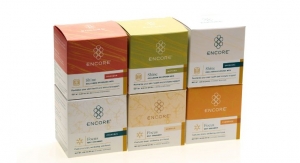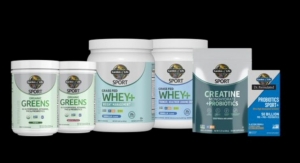By Sean Moloughney, Editor, Nutraceuticals World09.04.18
As more consumers recognize the link between proper nutrition and good health, including appearance of hair, skin, and nails, collagen has gained popularity as an ideal beauty and healthy aging ingredient with versatile range for product development.
More than half of consumers worldwide perceive collagen as a beauty-enhancing ingredient, according to data and analytics company GlobalData. The growing popularity of collagen-fortified food/beverages is driven in part by the positive perception of the ingredient among consumers around the world. While animal-sourced collagen in beauty products goes against the current growth trend of plant-based alternatives, widespread use of collagen is likely to continue, the company said.
Knowledge & Need
While consumers in Asia have understood the concept of beauty from within for many years, Americans have been slower to catch on, according to Suhail Ishaq, president, BioCell Technology, LLC. “But now we see the market growing rapidly. At BioCell we have seen an increase in BioCell Collagen inquiries as well as an increased number of new products in the marketplace. Consumers are looking for collagen ingredients that have clinical support, so they know what benefit to expect and when.”
An abundance of research and overall knowledge around collagen are helping drive growth in the U.S., according to Katie Stevenson, business development manager, Nitta Gelatin North America. “Consumers are more knowledgeable about collagen and the benefits related to it—including bone and joint health, beauty from within, and dietary protein supplementation.”
Nutritional needs change over time as part of the natural aging process, she added. “Changes in collagen levels within the body drop dramatically throughout our lifespan, with studies suggesting that overall collagen begins to decline as early as our 20s. The benefits of adding collagen into our diets has shown great benefit, for both functional health effects, and as a dietary protein source.”
Health-conscious individuals are the primary drivers of growth in collagen products, according to Amanda Orloske, senior director of marketing and international sales, Biova. “Collagen production drops off as we age and although we may have had plenty in our 20s to keep our joints supple and our skin smooth, as we move into our 40s and beyond we begin to see the need for supplementation to augment that natural decline.”
Generally, more consumers recognize that what they do today affects their quality of life later on, noted Heather Arment, marketing coordinator, North America, GELITA USA. “Collagen is a major component of the human body, comprising about 30% of our total body protein. One of the primary structural proteins of connective tissues, it is a vital component of our whole body; so, collagen peptide supplementation helps us stay beautiful, flexible, mobile, and strong for longer.”
Healthy aging is relevant to all consumers, independent of age, she added, “from the younger 20- and 30-somethings who are seeking to delay the negative physical impacts that accompany aging, to those 40, 50 and older who are seeking to actively manage the impacts of aging.” More than living longer, consumers strive to live longer, better. They want to look better while aging too.
Because collagen is the major structural component of skin—giving its firm structure—it plays an essential role in skin health. Collagen also plays an important role in the health of the entire musculoskeletal system, Ms. Arment said. “As we age, the decline in our collagen production and quality of our remaining collagen can result in a considerable loss of quality of life, whether a loss in muscle tone and strength (sarcopenia), low bone mass leading to enhanced bone fragility and increased fracture risk, or wear and tear of joint cartilage resulting in decreased mobility. So protein supplementation with collagen protein—generally in the form of collagen peptides (short-chain protein building blocks produced by hydrolysis of native collagen)—helps us stay beautiful, flexible, mobile, and strong.”
Samantha Ford, business development director, AIDP, noted that according to the U.S. Centers for Disease Control and Prevention (CDC), more than 22% of the U.S. population has some form of arthritis. More than 15 million adults report having severe joint discomfort, which is one of the leading causes of work disability and activity limitation.
“People are living much longer and want to stay active in their later years,” she added. “As bone and joint issues are increasingly common with age, consumers are constantly looking for solutions to help maintain their flexibility, strength, and range of motion. This is one of the key driving factors in the growth of collagen products. Given that collagen is a major component for healthy skin, hair, and nails, along with bones and joints, younger consumers also can’t get enough. In addition, formulation has improved so that people can get collagen in all kinds of foods and beverages. AIDP specializes in formulation challenges and has been working hard to continually improve taste and texture of its collagen ingredients in finished products.”
Years of research have solidified the positive benefits of collagen for skin and joint health, according to Annie Vo, R&D specialist, Vinh Wellness. “The improved technology has produced not only highly absorbable collagen but also allows for the formulation of easy-to-consume collagen products such as bone broths, protein shakes, refreshing beverages, etc. Meanwhile, the aging populations of first world countries with the median age of 30 and above have become the primary consumers, especially women.”
Education is a critical component of market growth, according to Ms. Arment. “With today’s consumers being better educated on the correlation between health and nutrition, they are also becoming more interested in understanding how these products work in collaboration with one another. This means consumers will favor products with the greatest amount of scientific research and substantiation.”
Diet, age, stress, digestive issues, and physical activity all affect the health of skin, joints, and connective tissue. Collagen should be an essential nutritional component for consumers hoping to remain healthy and active throughout their life, noted Mr. Ishaq. “After we reach adulthood, collagen production in the body gradually declines. As a result, the skin becomes thinner and joints degrade with age.” Supplementation helps stimulate the body’s production of collagen and promote joint and skin health.
Ideally, consumers would get all important nutrients from a healthy diet rich in whole foods, said Ms. Ford. “However, it’s not that simple with today’s lifestyle; people need high quality supplements to fill the gaps in their diet. When it comes to bone and joint health, supplements can help provide the building blocks for maintaining strength and flexibility, especially as we age and our bodies go through some of the typical wear and tear.”
People are also living longer, remaining physically active, and they want to look and feel their best regardless of age, she added. “Over time, the human body inevitably goes through changes; bones and joints become more brittle and start to lose flexibility, and tissues start to lose their elasticity, making us more prone to injury and discomfort. We are asking things of our bodies at 60 that are more demanding than ever.”
Supplementation with types I and III collagen has been shown to improve skin elasticity, hydration, and wrinkles, noted Ms. Voh. In addition, research has shown that type II collagen reduces joint pain and osteoarthritis symptoms.
“The internal collagen reservoir is depleted over time, hence increasing the need for collagen supplementation as one ages. This natural process is expedited by UV and harmful chemical exposures,” she added. “Around the age of 20, internal collagen production begins to decline by a small percentage per year. Effects of this decline begin to show physical aging signs from 30 years. Post menopause, the decline becomes steeper. By the age of 80, one only has about one-third of collagen production compared to people under 30 years of age. Although not yet proven, supplementing collagen early on may delay the onset of aging signs.”
Product Innovation
Collagen powders, drinks, and bars are among the most popular forms of finished products, according to Ms. Ford. “Formulating with collagen can be challenging as it can be grainy or have an off-taste. AIDP is constantly innovating and adjusting its formulation to adapt to new and improved delivery systems. For instance, AIDP’s Naticol Type I marine collagen comes in a highly soluble powder grade that is essentially odorless and tasteless—ideal for beverage formulations.”
While there are many product formats available on the market, powder supplements that can be added to a beverage seem to be the most popular, noted Ms. Orloske. “But you can get collagen in many different multi-ingredient formulations that come in all delivery formats. The biggest drawback to a tub of collagen powder is the inconvenience of traveling with it. Stick packs make getting your daily dose much more convenient on the go.” Biova manufactures water-soluble egg membrane, which contains collagen, as well as elastin, hyaluronic acid, glycosaminoglycans, and a variety of amino acids and proteins.
Versatility really is the key benefit when formulating with collagen peptides, according to Liz Clarke, applications scientist, Nitta Gelatin. “Compared to other protein sources, collagen peptides are stable over a wide range of temperatures and pH environments. This, along with exceptional water solubility, neutral taste, and light color, allow collagen peptides to be incorporated into a wide variety of product formats. From bars to beverages, soft-capsules to gummies, collagen peptides are popping up across all sectors of the functional food and nutraceutical market.”
Ms. Clarke noted more beverage applications in North America, both in powdered and ready-to-drink formats. “While shot-type and powdered beverage products have been popular in Asia for years, we are just now seeing them gain traction domestically. It’s a very exciting time for new product development with collagen peptides.”
However, she cautioned that “not all collagen is created equal, and each of our collagen peptide products is created for a specific role. Molecular weight, particle size, dissolution profile, and source all play a role in product performance in a desired application. At Nitta Gelatin North America, we offer full application support, with a dedicated staff of Certified Food Scientists, to ensure our customers have the right collagen for their unique product.”
Beverages and food have become especially popular product formats, according to Ms. Vo. “Collagen supplementation for these categories come in a vast variety of forms—protein shake powder blends, flavored drinks, bone broths, jelly desserts, collagen-infused liquor, pudding, ice cream, yogurts, cakes, snacks, etc. However, some forms may not be the best for preserving the integrity of the supplemental collagen or may slow absorption of collagen into the body.”
Overall though, companies continue to innovate with collagen-based beverages, foods, and supplements. “Collagen-based chews and gummies as well as beverages are convenient and portable, offering the benefits of collagen supplementation in fun and indulgent delivery systems,” said Ms. Arment. “GELITA’s Collagen Peptides are highly versatile. They are highly dispersible, highly dissolvable and highly soluble, lending themselves to a host of applications and delivery systems. With their special nutritional and technological properties, these pure proteins are enjoying increasing popularity throughout the beverage, food, and health and nutrition industries not only because they can be easily incorporated into various types of applications, but also because they are non-allergenic and free from additives, carbohydrates, cholesterol, fat, gluten and sugar—and they are neutral in odor and taste. In their natural form, they do not react with other ingredients; therefore, they can enhance and optimize the most diverse applications.”
Supplying Support
In the information age, consumers are increasingly more skeptical about ingredients and are demanding more transparency from manufacturers, noted Mr. Ishaq. “Everything from source, quality, purity, non-GMO, and clinical substantiation are all factors that consumers consider. The advantage of a branded ingredient like BioCell Collagen is that consumers know it is made by a reputable company that has vetted its supply chain and produces a consistent product they can rely on for efficacy. BioCell Collagen is made exclusively in the USA and Europe.”
Poor-quality, adulterated products that borrow science conducted on different ingredients to substantiate claims are a hazard to the broader marketplace, according to Mr. Ishaq. “The spurious companies that market these products often look for the cheapest ingredients they can find in the world without regard to quality. Unfortunately, consumers who are not savvy enough to discern the difference by looking at product labels end up buying an inferior product that fails to deliver results. This hurts the reputation of the product category and consumer confidence in dietary supplements in general.”
Mr. Ishaq noted that BioCell Collagen is unique because it is composed of collagen type II peptides, chondroitin sulfate, and hyaluronic acid in a naturally occurring matrix, and clinical research has demonstrated multiple skin benefits. BioCell Collagen is also clinically substantiated to promote joint comfort and mobility, he added.
AIDP has several ingredients to support mobility, joint health and exercise recovery. KoACT is a patented combination of collagen and calcium and has been demonstrated to improve bone mineral density, bone strength, and flexibility, according to Ms. Ford. “Bone mass is made up of 75% calcium and inorganic minerals, and 25% collagen. The collagen component is critical to bone structure and function because it helps keep bones flexible and absorb impact, especially during physical activity. KoAct’s patented composition drives collagen to the bone matrix, providing a stronger, more flexible bone. KoAct’s unique collagen formula delivers more than bone mineral density. It provides a strong, flexible, and fibrous protein network that supports bone structure and helps bone withstand daily impact.”
AIDP also markets KollaGen II-xs, a specialized type II collagen designed to support joint health, including range of motion, flexibility, and overall joint comfort, according to Ms. Ford. “KollaGen II-xs is produced from avian sternum through a proprietary, solvent-free technology that preserves the integrity of key joint health nutrients. “KollaGen II-xs provides all of the major components of joint cartilage—55-70% collagen type II along with chondroitin, glucosamine, and hyaluronic acid—in a ratio similar to what’s naturally present in our bodies,” said Ms. Ford. This specialized formula provides a synergistic effect on joint health and function.”
There are many complex technical challenges in developing collagen products, said Ms. Vo. “For beverages, solubility in water at various temperatures is necessary. Other factors from electrostatic charge, dispersion, moisture exchange, stabilization, and blending uniformity are all important in making a tablet, capsule, and powder product formulation.”
Produced by Vinh Wellness (Vietnam), LumiColl is a unique collagen product available to the U.S. from Gencor Pacific. This pharmaceutical-grade, single-source freshwater collagen peptide is stable and fully traceable from its source, according to Ms. Vo.
“Vinh Wellness’s collagen is derived from one species of freshwater, tropical fish called Pangasius hypophthalmus. This is what gives Vinh Wellness’s collagen a unique and highly beneficial amino acid profile. It is characterized by high concentrations of glycine, proline, and hydroxyproline, which represent 50% of the total amino acids. LumiColl has no artificial colors, flavors, additives, or preservatives and is also free of fat, carbs, sugar, and cholesterol.”
LumiColl is also Halal certified and free of pork or beef products, making it widely accepted across cultures and religions. LumiColl meets many technical challenges “as it is highly soluble and has excellent flowability, which is affected by electrostatic charge. Our collagen powder also has great dispersion making it ideal for beverage and food applications.” Good stabilization also makes encapsulation easy, she added. “When it comes to putting collagen in tablet form, LumiColl does require an excipient which is common for many other ingredients.”
More than half of consumers worldwide perceive collagen as a beauty-enhancing ingredient, according to data and analytics company GlobalData. The growing popularity of collagen-fortified food/beverages is driven in part by the positive perception of the ingredient among consumers around the world. While animal-sourced collagen in beauty products goes against the current growth trend of plant-based alternatives, widespread use of collagen is likely to continue, the company said.
Knowledge & Need
While consumers in Asia have understood the concept of beauty from within for many years, Americans have been slower to catch on, according to Suhail Ishaq, president, BioCell Technology, LLC. “But now we see the market growing rapidly. At BioCell we have seen an increase in BioCell Collagen inquiries as well as an increased number of new products in the marketplace. Consumers are looking for collagen ingredients that have clinical support, so they know what benefit to expect and when.”
An abundance of research and overall knowledge around collagen are helping drive growth in the U.S., according to Katie Stevenson, business development manager, Nitta Gelatin North America. “Consumers are more knowledgeable about collagen and the benefits related to it—including bone and joint health, beauty from within, and dietary protein supplementation.”
Nutritional needs change over time as part of the natural aging process, she added. “Changes in collagen levels within the body drop dramatically throughout our lifespan, with studies suggesting that overall collagen begins to decline as early as our 20s. The benefits of adding collagen into our diets has shown great benefit, for both functional health effects, and as a dietary protein source.”
Health-conscious individuals are the primary drivers of growth in collagen products, according to Amanda Orloske, senior director of marketing and international sales, Biova. “Collagen production drops off as we age and although we may have had plenty in our 20s to keep our joints supple and our skin smooth, as we move into our 40s and beyond we begin to see the need for supplementation to augment that natural decline.”
Generally, more consumers recognize that what they do today affects their quality of life later on, noted Heather Arment, marketing coordinator, North America, GELITA USA. “Collagen is a major component of the human body, comprising about 30% of our total body protein. One of the primary structural proteins of connective tissues, it is a vital component of our whole body; so, collagen peptide supplementation helps us stay beautiful, flexible, mobile, and strong for longer.”
Healthy aging is relevant to all consumers, independent of age, she added, “from the younger 20- and 30-somethings who are seeking to delay the negative physical impacts that accompany aging, to those 40, 50 and older who are seeking to actively manage the impacts of aging.” More than living longer, consumers strive to live longer, better. They want to look better while aging too.
Because collagen is the major structural component of skin—giving its firm structure—it plays an essential role in skin health. Collagen also plays an important role in the health of the entire musculoskeletal system, Ms. Arment said. “As we age, the decline in our collagen production and quality of our remaining collagen can result in a considerable loss of quality of life, whether a loss in muscle tone and strength (sarcopenia), low bone mass leading to enhanced bone fragility and increased fracture risk, or wear and tear of joint cartilage resulting in decreased mobility. So protein supplementation with collagen protein—generally in the form of collagen peptides (short-chain protein building blocks produced by hydrolysis of native collagen)—helps us stay beautiful, flexible, mobile, and strong.”
Samantha Ford, business development director, AIDP, noted that according to the U.S. Centers for Disease Control and Prevention (CDC), more than 22% of the U.S. population has some form of arthritis. More than 15 million adults report having severe joint discomfort, which is one of the leading causes of work disability and activity limitation.
“People are living much longer and want to stay active in their later years,” she added. “As bone and joint issues are increasingly common with age, consumers are constantly looking for solutions to help maintain their flexibility, strength, and range of motion. This is one of the key driving factors in the growth of collagen products. Given that collagen is a major component for healthy skin, hair, and nails, along with bones and joints, younger consumers also can’t get enough. In addition, formulation has improved so that people can get collagen in all kinds of foods and beverages. AIDP specializes in formulation challenges and has been working hard to continually improve taste and texture of its collagen ingredients in finished products.”
Years of research have solidified the positive benefits of collagen for skin and joint health, according to Annie Vo, R&D specialist, Vinh Wellness. “The improved technology has produced not only highly absorbable collagen but also allows for the formulation of easy-to-consume collagen products such as bone broths, protein shakes, refreshing beverages, etc. Meanwhile, the aging populations of first world countries with the median age of 30 and above have become the primary consumers, especially women.”
Education is a critical component of market growth, according to Ms. Arment. “With today’s consumers being better educated on the correlation between health and nutrition, they are also becoming more interested in understanding how these products work in collaboration with one another. This means consumers will favor products with the greatest amount of scientific research and substantiation.”
Diet, age, stress, digestive issues, and physical activity all affect the health of skin, joints, and connective tissue. Collagen should be an essential nutritional component for consumers hoping to remain healthy and active throughout their life, noted Mr. Ishaq. “After we reach adulthood, collagen production in the body gradually declines. As a result, the skin becomes thinner and joints degrade with age.” Supplementation helps stimulate the body’s production of collagen and promote joint and skin health.
Ideally, consumers would get all important nutrients from a healthy diet rich in whole foods, said Ms. Ford. “However, it’s not that simple with today’s lifestyle; people need high quality supplements to fill the gaps in their diet. When it comes to bone and joint health, supplements can help provide the building blocks for maintaining strength and flexibility, especially as we age and our bodies go through some of the typical wear and tear.”
People are also living longer, remaining physically active, and they want to look and feel their best regardless of age, she added. “Over time, the human body inevitably goes through changes; bones and joints become more brittle and start to lose flexibility, and tissues start to lose their elasticity, making us more prone to injury and discomfort. We are asking things of our bodies at 60 that are more demanding than ever.”
Supplementation with types I and III collagen has been shown to improve skin elasticity, hydration, and wrinkles, noted Ms. Voh. In addition, research has shown that type II collagen reduces joint pain and osteoarthritis symptoms.
“The internal collagen reservoir is depleted over time, hence increasing the need for collagen supplementation as one ages. This natural process is expedited by UV and harmful chemical exposures,” she added. “Around the age of 20, internal collagen production begins to decline by a small percentage per year. Effects of this decline begin to show physical aging signs from 30 years. Post menopause, the decline becomes steeper. By the age of 80, one only has about one-third of collagen production compared to people under 30 years of age. Although not yet proven, supplementing collagen early on may delay the onset of aging signs.”
Product Innovation
Collagen powders, drinks, and bars are among the most popular forms of finished products, according to Ms. Ford. “Formulating with collagen can be challenging as it can be grainy or have an off-taste. AIDP is constantly innovating and adjusting its formulation to adapt to new and improved delivery systems. For instance, AIDP’s Naticol Type I marine collagen comes in a highly soluble powder grade that is essentially odorless and tasteless—ideal for beverage formulations.”
While there are many product formats available on the market, powder supplements that can be added to a beverage seem to be the most popular, noted Ms. Orloske. “But you can get collagen in many different multi-ingredient formulations that come in all delivery formats. The biggest drawback to a tub of collagen powder is the inconvenience of traveling with it. Stick packs make getting your daily dose much more convenient on the go.” Biova manufactures water-soluble egg membrane, which contains collagen, as well as elastin, hyaluronic acid, glycosaminoglycans, and a variety of amino acids and proteins.
Versatility really is the key benefit when formulating with collagen peptides, according to Liz Clarke, applications scientist, Nitta Gelatin. “Compared to other protein sources, collagen peptides are stable over a wide range of temperatures and pH environments. This, along with exceptional water solubility, neutral taste, and light color, allow collagen peptides to be incorporated into a wide variety of product formats. From bars to beverages, soft-capsules to gummies, collagen peptides are popping up across all sectors of the functional food and nutraceutical market.”
Ms. Clarke noted more beverage applications in North America, both in powdered and ready-to-drink formats. “While shot-type and powdered beverage products have been popular in Asia for years, we are just now seeing them gain traction domestically. It’s a very exciting time for new product development with collagen peptides.”
However, she cautioned that “not all collagen is created equal, and each of our collagen peptide products is created for a specific role. Molecular weight, particle size, dissolution profile, and source all play a role in product performance in a desired application. At Nitta Gelatin North America, we offer full application support, with a dedicated staff of Certified Food Scientists, to ensure our customers have the right collagen for their unique product.”
Beverages and food have become especially popular product formats, according to Ms. Vo. “Collagen supplementation for these categories come in a vast variety of forms—protein shake powder blends, flavored drinks, bone broths, jelly desserts, collagen-infused liquor, pudding, ice cream, yogurts, cakes, snacks, etc. However, some forms may not be the best for preserving the integrity of the supplemental collagen or may slow absorption of collagen into the body.”
Overall though, companies continue to innovate with collagen-based beverages, foods, and supplements. “Collagen-based chews and gummies as well as beverages are convenient and portable, offering the benefits of collagen supplementation in fun and indulgent delivery systems,” said Ms. Arment. “GELITA’s Collagen Peptides are highly versatile. They are highly dispersible, highly dissolvable and highly soluble, lending themselves to a host of applications and delivery systems. With their special nutritional and technological properties, these pure proteins are enjoying increasing popularity throughout the beverage, food, and health and nutrition industries not only because they can be easily incorporated into various types of applications, but also because they are non-allergenic and free from additives, carbohydrates, cholesterol, fat, gluten and sugar—and they are neutral in odor and taste. In their natural form, they do not react with other ingredients; therefore, they can enhance and optimize the most diverse applications.”
Supplying Support
In the information age, consumers are increasingly more skeptical about ingredients and are demanding more transparency from manufacturers, noted Mr. Ishaq. “Everything from source, quality, purity, non-GMO, and clinical substantiation are all factors that consumers consider. The advantage of a branded ingredient like BioCell Collagen is that consumers know it is made by a reputable company that has vetted its supply chain and produces a consistent product they can rely on for efficacy. BioCell Collagen is made exclusively in the USA and Europe.”
Poor-quality, adulterated products that borrow science conducted on different ingredients to substantiate claims are a hazard to the broader marketplace, according to Mr. Ishaq. “The spurious companies that market these products often look for the cheapest ingredients they can find in the world without regard to quality. Unfortunately, consumers who are not savvy enough to discern the difference by looking at product labels end up buying an inferior product that fails to deliver results. This hurts the reputation of the product category and consumer confidence in dietary supplements in general.”
Mr. Ishaq noted that BioCell Collagen is unique because it is composed of collagen type II peptides, chondroitin sulfate, and hyaluronic acid in a naturally occurring matrix, and clinical research has demonstrated multiple skin benefits. BioCell Collagen is also clinically substantiated to promote joint comfort and mobility, he added.
AIDP has several ingredients to support mobility, joint health and exercise recovery. KoACT is a patented combination of collagen and calcium and has been demonstrated to improve bone mineral density, bone strength, and flexibility, according to Ms. Ford. “Bone mass is made up of 75% calcium and inorganic minerals, and 25% collagen. The collagen component is critical to bone structure and function because it helps keep bones flexible and absorb impact, especially during physical activity. KoAct’s patented composition drives collagen to the bone matrix, providing a stronger, more flexible bone. KoAct’s unique collagen formula delivers more than bone mineral density. It provides a strong, flexible, and fibrous protein network that supports bone structure and helps bone withstand daily impact.”
AIDP also markets KollaGen II-xs, a specialized type II collagen designed to support joint health, including range of motion, flexibility, and overall joint comfort, according to Ms. Ford. “KollaGen II-xs is produced from avian sternum through a proprietary, solvent-free technology that preserves the integrity of key joint health nutrients. “KollaGen II-xs provides all of the major components of joint cartilage—55-70% collagen type II along with chondroitin, glucosamine, and hyaluronic acid—in a ratio similar to what’s naturally present in our bodies,” said Ms. Ford. This specialized formula provides a synergistic effect on joint health and function.”
There are many complex technical challenges in developing collagen products, said Ms. Vo. “For beverages, solubility in water at various temperatures is necessary. Other factors from electrostatic charge, dispersion, moisture exchange, stabilization, and blending uniformity are all important in making a tablet, capsule, and powder product formulation.”
Produced by Vinh Wellness (Vietnam), LumiColl is a unique collagen product available to the U.S. from Gencor Pacific. This pharmaceutical-grade, single-source freshwater collagen peptide is stable and fully traceable from its source, according to Ms. Vo.
“Vinh Wellness’s collagen is derived from one species of freshwater, tropical fish called Pangasius hypophthalmus. This is what gives Vinh Wellness’s collagen a unique and highly beneficial amino acid profile. It is characterized by high concentrations of glycine, proline, and hydroxyproline, which represent 50% of the total amino acids. LumiColl has no artificial colors, flavors, additives, or preservatives and is also free of fat, carbs, sugar, and cholesterol.”
LumiColl is also Halal certified and free of pork or beef products, making it widely accepted across cultures and religions. LumiColl meets many technical challenges “as it is highly soluble and has excellent flowability, which is affected by electrostatic charge. Our collagen powder also has great dispersion making it ideal for beverage and food applications.” Good stabilization also makes encapsulation easy, she added. “When it comes to putting collagen in tablet form, LumiColl does require an excipient which is common for many other ingredients.”




























